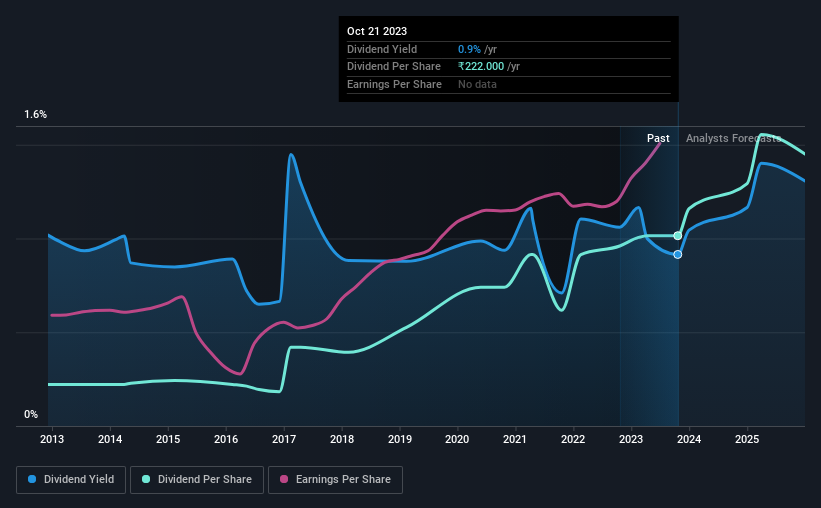Nestlé India's (NSE:NESTLEIND) Dividend Will Be Increased To ₹140.00

Nestlé India Limited (NSE:NESTLEIND) has announced that it will be increasing its periodic dividend on the 16th of November to ₹140.00, which will be 17% higher than last year's comparable payment amount of ₹120.00. This takes the annual payment to 0.9% of the current stock price, which is about average for the industry.
View our latest analysis for Nestlé India
Nestlé India's Payment Has Solid Earnings Coverage
We aren't too impressed by dividend yields unless they can be sustained over time. Before making this announcement, Nestlé India was paying out quite a large proportion of both earnings and cash flow, with the dividend being 112% of cash flows. Paying out such a high proportion of cash flows certainly exposes the company to cutting the dividend if cash flows were to reduce.
The next year is set to see EPS grow by 52.5%. Under the assumption that the dividend will continue along recent trends, we think the payout ratio could be 66% which would be quite comfortable going to take the dividend forward.

Dividend Volatility
The company's dividend history has been marked by instability, with at least one cut in the last 10 years. The annual payment during the last 10 years was ₹48.50 in 2013, and the most recent fiscal year payment was ₹222.00. This implies that the company grew its distributions at a yearly rate of about 16% over that duration. Dividends have grown rapidly over this time, but with cuts in the past we are not certain that this stock will be a reliable source of income in the future.
Dividend Growth Could Be Constrained
Given that the dividend has been cut in the past, we need to check if earnings are growing and if that might lead to stronger dividends in the future. It's encouraging to see that Nestlé India has been growing its earnings per share at 13% a year over the past five years. EPS has been growing at a reasonable rate, although with most of the profits being paid out to shareholders, growth prospects could be more limited in the future.
Nestlé India's Dividend Doesn't Look Sustainable
Overall, this is probably not a great income stock, even though the dividend is being raised at the moment. In general, the distributions are a little bit higher than we would like, but we can't ignore the fact the quickly growing earnings gives this stock great potential in the future. We don't think Nestlé India is a great stock to add to your portfolio if income is your focus.
Investors generally tend to favour companies with a consistent, stable dividend policy as opposed to those operating an irregular one. Still, investors need to consider a host of other factors, apart from dividend payments, when analysing a company. To that end, Nestlé India has 2 warning signs (and 1 which doesn't sit too well with us) we think you should know about. Looking for more high-yielding dividend ideas? Try our collection of strong dividend payers.
Valuation is complex, but we're here to simplify it.
Discover if Nestlé India might be undervalued or overvalued with our detailed analysis, featuring fair value estimates, potential risks, dividends, insider trades, and its financial condition.
Access Free AnalysisHave feedback on this article? Concerned about the content? Get in touch with us directly. Alternatively, email editorial-team (at) simplywallst.com.
This article by Simply Wall St is general in nature. We provide commentary based on historical data and analyst forecasts only using an unbiased methodology and our articles are not intended to be financial advice. It does not constitute a recommendation to buy or sell any stock, and does not take account of your objectives, or your financial situation. We aim to bring you long-term focused analysis driven by fundamental data. Note that our analysis may not factor in the latest price-sensitive company announcements or qualitative material. Simply Wall St has no position in any stocks mentioned.
About NSEI:NESTLEIND
Nestlé India
Manufactures and sells food products in India and internationally.
Adequate balance sheet average dividend payer.

